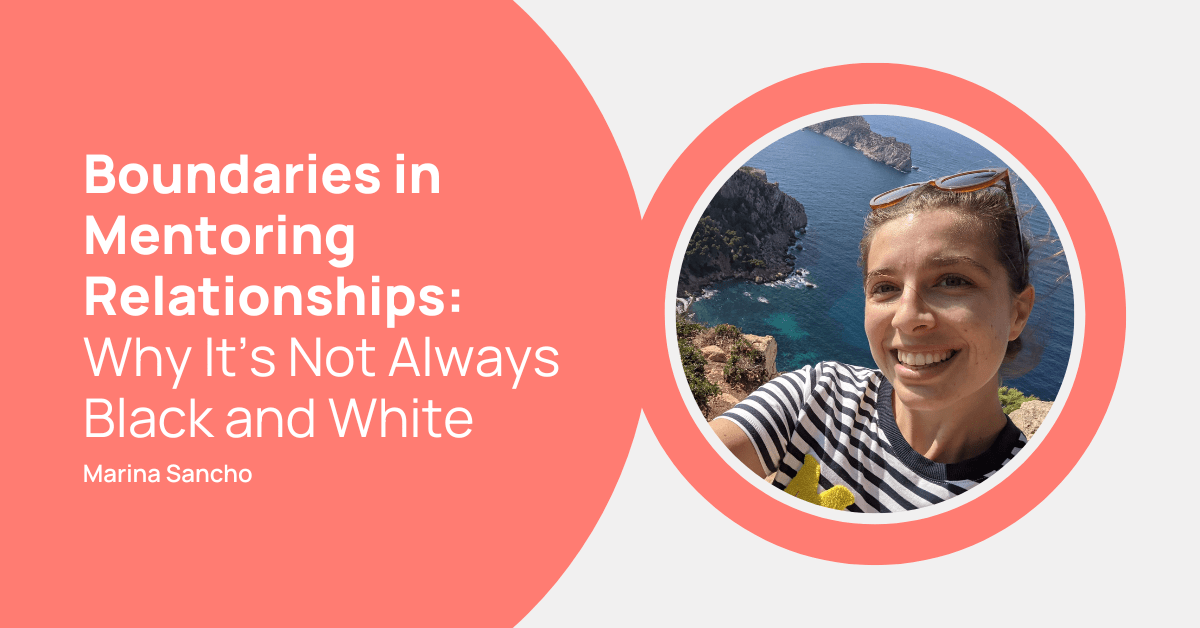Mentorloop’s Director for Customer Growth, Marina Sancho, shares her thoughts on boundaries and flexibility in mentoring relationships.
It’s standard practice for us here at Mentorloop to make sure that we read and respond to every piece of feedback we receive. And recently, a mentee on one of our programs sent this in:
“I think my relationship with [my mentor] has turned more into an auntie-like role 😂”
When we read this, it posed a few questions. Is this a good thing? Should we steer the mentee in a different direction? Do we recommend that they set some boundaries? (We could share one of our blog posts about what a mentor is and isn’t!) Or do we just say we are pleased to hear they have a great relationship with their mentor?

Addressing Contradictions on the Role of Mentors
We draw clear distinctions between what a mentor is and is not in an attempt to set some expectations and to stop mentees from getting “too comfortable”. These boundaries also serve to encourage accountability and progress in the relationship.
However, there are a few seemingly contradictory things that come into play here.
We all know that a mentor’s role is to provide guidance and support. However, they ultimately have to keep a certain distance to allow their mentees to find their own answers.
We also believe that being open and vulnerable to develop a good, close rapport is at the heart of great mentoring.
So how do we reconcile these two ideas?
Finding Balance
It will be slightly different for every organization, every program, and every relationship, but in general, we know that mentors are there to guide and support without directing or being overly involved.
So while a mentor shouldn’t be a mentee’s coach, a good mentor will sometimes coach a mentee.
A mentor is not a manager, but a good mentor will sometimes fulfill some of a manager’s responsibilities, especially when a manager isn’t doing their part.
A mentor is not a therapist, but they can serve as a sounding board that can help mentees work through their struggles more objectively.
You get the idea – there are some general guidelines to follow for mentoring relationships, but there has to be room for flexibility. You can set rules all you want, but people are gonna be people and that’s where the ✨magic✨ is! So when forming mentoring relationships, they should feel like they can be themselves so they can thrive.
So, while a level of distance and professionalism should be maintained in mentoring relationships, being open and honest is important too! Sharing personal stories, including the setbacks and struggles, is essential in both sides of a healthy mentoring relationship. Embracing vulnerability allows mentors to cultivate trust and encourages mentees to mirror the same openness in return. This deepens understanding and paves the way for genuine transformation.
And so while a mentor isn’t an “auntie,” there’s no reason they can’t offer the comfort, guidance, and support that an auntie might give a mentee when it’s needed.
Different program coordinators will set different expectations for what’s considered acceptable familiarity in their mentoring programs. What’s encouraged in one program might be frowned upon in another.
But at the end of the day, that’s not as important as understanding that mentoring is a connection between two people, which, like any relationship, will take its own shape and form. And while many will fit within the general idea that most hold, for some, the “mentor” and “mentee” labels won’t cut it. Sometimes, “auntie” is more fitting.
So what did we do with regard to the mentee who sent in feedback about their mentor being an auntie figure?
We decided not to redirect them or tell them that they shouldn’t confuse their mentor with an auntie figure. Because maybe an auntie’s support is what the mentee needed that day, and we certainly don’t want to send the message that this supportive relationship was somehow wrong.
We all need mentors who show up for us and if this is what it looks like for this mentee – then that’s wonderful! ❤️




